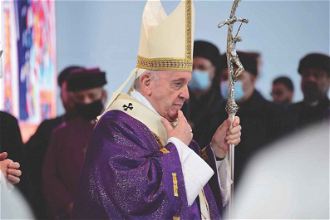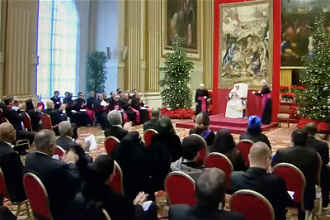Pope urges diplomats to strive for culture of dialogue and respect

Dialogue, diplomacy and respect for human dignity must be the key to resolving national and international conflicts: that was the message Pope Francis gave to the more than 180 ambassadors accredited to the Holy See, who gathered yesterday for the traditional New Year greetings to the diplomatic corps.
Speaking in Italian to the ambassadors, Pope Francis reiterated that a spirit of fraternity, as the foundation for peace, should be learned first within the family. The message of the Christmas Crib, he said, shows the Holy Family, “not alone and isolated….but surrounded by shepherds and the Magi, that is by an open community in which there is room for everyone, poor and rich alike”.
Sadly he noted there is a rise in broken and troubled families, not just because of a “weakening sense of belonging….but also because of the adverse conditions in which many families are forced to live”. The Pope stressed there is a need for suitable policies aimed at supporting, assisting and strengthening the family. In particular, he said, it’s important to invest in the elderly and the young, favouring a culture of encounter, communion and peacemaking.
Looking at particular areas of crisis in the world, Pope Francis expressed his hope that the conflict in Syria will finally come to an end and that the Geneva conference will mark the beginning of the desired peace process. It is unacceptable, he said, that unarmed civilians, especially children, become targets and he praised efforts of neighbouring countries which have welcomed numerous refugees from Syria. The Pope also spoke of his concerns in the wider Middle East region, in Lebanon, Egypt and Iraq, but at the same time noted with satisfaction the “significant progress made in the dialogue between Iran and the Group of 5+1 on the nuclear issue”.
Echoing the words of his predecessor Benedict XV at the start of the First World War, in this centenary year, Pope Francis reiterated that “the moral force of law” must prevail over “the material force of arms”. What is needed, he stressed, is the courage to go beyond the surface of the conflict and consider the dignity of others, so that it becomes possible to build communion amid disagreement. In this light, he said he hoped the positive resumption of talks between Israelis and Palestinians will lead to a just and lasting solution, with the support of the international community.
Turning his attention to Africa, Pope Francis spoke of the suffering and violence in Nigeria and the Central African Republic, saying the Catholic Church will continue to work to build reconciliation and peace.
Christians, he stressed, are called to give witness to God’s love and mercy, even in the face of acts of intolerance or persecution. He encouraged those working towards a restoration of democracy in Mali and noted with concern the new humanitarian crisis unfolding in South Sudan.
Focusing on the countries of Asia next, Pope Francis spoke of the need for reconciliation on the Korean peninsula, calling on all interested parties to tirelessly seek out possible solutions. Noting Asia’s long history of peaceful coexistence between different civil, ethnic and religious groups, he spoke with concern of “growing attitudes of prejudice, for allegedly religious reasons, …that deprive Christians of their liberties and jeopardize civil coexistence.
The Pope said peace is always threatened by the denial of human dignity, beginning with the lack of access to adequate nutrition. He said we cannot be indifferent to the hunger and suffering of children, especially when we consider the “throwaway culture” of waste in other parts of the world. Even human beings themselves are discarded as unnecessary, for example victims of abortion, child soldiers or those who are bought and sold in human trafficking which he called a crime against humanity.
Speaking of those forced to flee from famine, violence or oppression, especially in the Horn of Africa or the Great Lakes Region, Pope Francis again spoke of the plight of refugees and migrants seeking a better life in Europe or the United States. Recalling his brief visit to the Italian island of Lampedusa, he stressed again the attitude of indifference in the face of those who lose their lives crossing the Mediterranean Sea.
Finally Pope Francis spoke of the threat to peace arising from “the greedy exploitation of environmental resources” and called for greater responsibility in pursuing policies respectful of the earth, which he called “our common home”. Mentioning the devastating effects of recent natural disasters, especially Typhoon Haiyan, the Pope said the Church will continue to offer her services and cooperate with all institutions working for the common good of individuals and communities.
To read the full text of Pope Francis' address see: www.indcatholicnews.com/news.php?viewStory=23964
Source: VIS


















